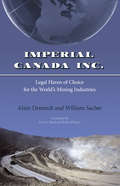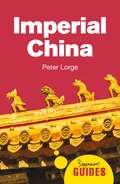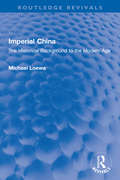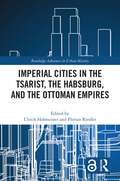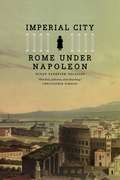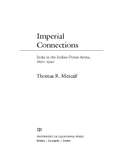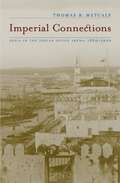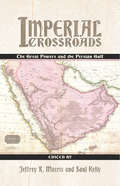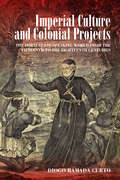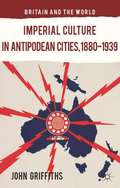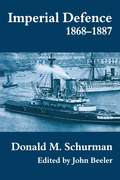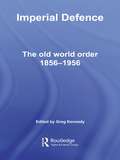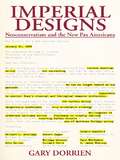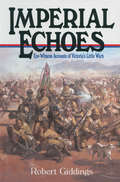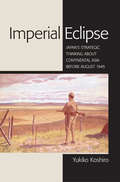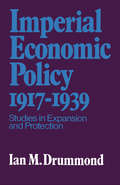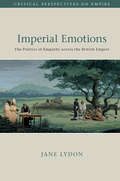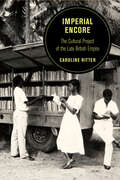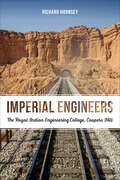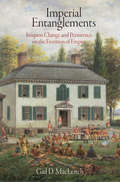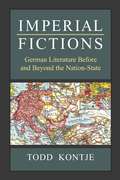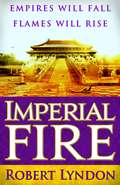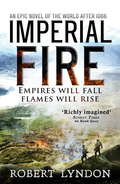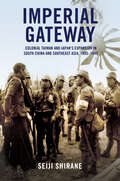- Table View
- List View
Imperial Canada Inc.
by Alain Deneault William SacherAsks (and answers) the simple question: why is Canada home to more than 70% of the world's mining companies?
Imperial China: A Beginner's Guide (Beginner's Guides)
by Dr. Peter LorgeIn 221 BCE, the Qin state conquered its neighbours and created the first unified Chinese empire in history. So began the imperial era, where dynasties claiming divine assent ruled for more than 2,000 years. Borders shifted and emperors struggled to exert control over every region of their diverse territories. Elites held that they were inheritors of a rich, pre-imperial culture, while their society produced world-changing inventions such as the compass, printing, gunpowder and the gun. And imperial China itself was altered as it came into contact with others through trade, exploration and war. For anyone curious about this fascinating period, Peter Lorge introduces imperial China&’s major ruling dynasties, religions, arts, thinkers, inventions, military advancements, economic developments and historians.
Imperial China: The Historical Background to the Modern Age (Routledge Revivals)
by Michael LoeweFirst published in 1966, Imperial China sets out to explain China’s past histories to non-specialists. Too often the West has misunderstood the East. China is credited with an excessively long cultural history; with a continuous line of dynastic succession; with uniformly practised institutions; or with intellectual stagnation. Michael Loewe sets out here to dispel some of these misconceptions, and to mark the stages in the evolution of China’s political forms, social organizations and economic progress that can be traced from the days of the first empire (from 221 B.C.) until the dynamic changes of the nineteenth century. He believes that a full understanding of modern China depends on a more than perfunctory glance at her past and has tried to provide the general historical context. The author is well aware that, thanks to the research of the last fifty years, it is now possible and indeed requisite to reach a deeper understanding of China's past. This book will be an essential read for scholars and researchers of Chinese history, Asian history, history in general.
Imperial Cities in the Tsarist, the Habsburg, and the Ottoman Empires (Routledge Advances in Urban History)
by Ulrich HofmeisterThis book explores the various ways imperial rule constituted and shaped the cities of Eastern Europe until the First World War in the Tsarist, Habsburg, and Ottoman empires. In these three empires, the cities served as hubs of imperial rule: their institutions and infrastructures enabled the diffusion of power within the empires while they also served as the stages where the empire was displayed in monumental architecture and public rituals. To this day, many cities possess a distinctively imperial legacy in the form of material remnants, groups of inhabitants, or memories that shape the perceptions of in- and outsiders. The contributions to this volume address in detail the imperial entanglements of a dozen cities from a long-term perspective reaching back to the eighteenth century. They analyze the imperial capitals as well as smaller cities in the periphery. All of them are "imperial cities" in the sense that they possess traces of imperial rule. By comparing the three empires of Eastern Europe this volume seeks to establish commonalities in this particular geography and highlight trans-imperial exchanges and entanglements. This volume is essential reading to students and scholars alike interested in imperial and colonial history, urban history and European history.
Imperial City: Rome Under Napoleon
by Susan Vandiver NicassioIn 1798, the armies of the French Revolution tried to transform Rome from the capital of the Papal States to a Jacobin Republic. For the next two decades, Rome was the subject of power struggles between the forces of the Empire and the Papacy, while Romans endured the unsuccessful efforts of Napoleon's best and brightest to pull the ancient city into the modern world. Against this historical backdrop, Nicassio weaves together an absorbing social, cultural, and political history of Rome and its people. Based on primary sources and incorporating two centuries of Italian, French, and international research, her work reveals what life was like for Romans in the age of Napoleon. "A remarkable book that wonderfully vivifies an understudied era in the history of Rome. . . . This book will engage anyone interested in early modern cities, the relationship between religion and daily life, and the history of the city of Rome. "--Journal of Modern History "An engaging account of Tosca's Rome. . . . Nicassio provides a fluent introduction to her subject. "--History Today "Meticulously researched, drawing on a host of original manuscripts, memoirs, personal letters, and secondary sources, enabling [Nicassio] to bring her story to life. "--History
Imperial Connections
by Thomas R. MetcalfAn innovative remapping of empire, Imperial Connections offers a broad-ranging view of the workings of the British Empire in the period when the India of the Raj stood at the center of a newly globalized system of trade, investment, and migration. Thomas R. Metcalf argues that India itself became a nexus of imperial power that made possible British conquest, control, and governance across a wide arc of territory stretching from Africa to eastern Asia. His book, offering a new perspective on how imperialism operates, emphasizes transcolonial interactions and webs of influence that advanced the interests of colonial India and Britain alike. Metcalf examines such topics as law codes and administrative forms as they were shaped by Indian precedents; the Indian Army's role in securing Malaya, Africa, and Mesopotamia for the empire; the employment of Indians, especially Sikhs, in colonial policing; and the transformation of East Africa into what was almost a province of India through the construction of the Uganda railway. He concludes with a look at the decline of this Indian Ocean system after 1920 and considers how far India's participation in it opened opportunities for Indians to be a colonizing as well as a colonized people.
Imperial Connections: India in the Indian Ocean Arena, 1860-1920
by Thomas R. MetcalfAn innovative remapping of empire, Imperial Connections offers a broad-ranging view of the workings of the British Empire in the period when the India of the Raj stood at the center of a newly globalized system of trade, investment, and migration. Thomas R. Metcalf argues that India itself became a nexus of imperial power that made possible British conquest, control, and governance across a wide arc of territory stretching from Africa to eastern Asia. His book, offering a new perspective on how imperialism operates, emphasizes transcolonial interactions and webs of influence that advanced the interests of colonial India and Britain alike. Metcalf examines such topics as law codes and administrative forms as they were shaped by Indian precedents; the Indian Army's role in securing Malaya, Africa, and Mesopotamia for the empire; the employment of Indians, especially Sikhs, in colonial policing; and the transformation of East Africa into what was almost a province of India through the construction of the Uganda railway. He concludes with a look at the decline of this Indian Ocean system after 1920 and considers how far India's participation in it opened opportunities for Indians to be a colonizing as well as a colonized people.
Imperial Crossroads
by Saul Kelly Jeffrey R. MacrisFor centuries the world's Great Powers, along with their fleets, armies, and intelligence services, have been drawn to the Persian Gulf region. Lying at the junction of three great continents - Asia, Europe, and Africa - and sitting athwart the oceanic trade routes that link the cities of the world, the Gulf, like a magnet, has pulled superpowers into the shallow waters and adjacent lands of the 600 mile long appendage of the Indian Ocean. An observer at Hormuz at the mouth of the Gulf would alternately have watched pass in the 15th century the treasure ships of Chinese Admiral Zheng He, in the 16th century the caravels of Portuguese Admiral Afonso de Albuquerqe, in the 17th century the merchant ships of the Dutch East India Company, in the 18th to the 20th centuries the frigates and steamships of the British, and finally in the late 20th century to today, the cruisers and aircraft carriers of the U.S. Fifth Fleet. Perhaps in the future, Americans may be supplanted by the Indians, or perhaps the Chinese.In the Great Powers' comings and goings since the 1400s, several consistent broad interests emerged. For the majority of this time, for example, the superpowers entered the Gulf region not to colonize, as the Europeans did in other places, but rather to further trade, which in the 20th century increasingly included oil. They also sought a military presence in the Gulf to protect seaborne flanks to colonial possessions further east on the Indian sub-continent and beyond (India, in fact, has long cast a shadow over the Gulf, given its historic trade and cultural ties to the Gulf region, strong ties that continue today). In their geo-political jockeying, furthermore, the Great Powers sought to deprive their rivals access to the states bordering the Gulf region. In tending to these enduring interests inside the Strait of Hormuz, the Great Powers through history concentrated their trade, political, and military presence along the littorals. Not surprisingly, their navies have played a substantive role.Imperial Crossroads: The Great Powers and the Persian Gulf is a collection of connected chapters, each of which investigates a different perspective in the broader subject of the Great Powers and their involvement with the states of the Persian Gulf. This volume concentrates on four western nations - Portugal, Holland, Britain, and the United States - and concludes with a look at the possible future involvement of two rising Asian powers - China and India.
Imperial Culture and Colonial Projects: The Portuguese-Speaking World from the Fifteenth to the Eighteenth Centuries
by Diogo Ramada CurtoBeyond the immeasurable political and economic changes it brought, colonial expansion exerted a powerful effect on Portuguese culture. And as this book demonstrates, the imperial culture that emerged over the course of four centuries was hardly a homogeneous whole, as triumphalist literature and other cultural forms mingled with recurrent doubts about the expansionist project. In a series of illuminating case studies, Ramada Curto follows the history and perception of major colonial initiatives while integrating the complex perspectives of participating agents to show how the empire’s life and culture were richly inflected by the operations of imperial expansion.
Imperial Culture in Antipodean Cities, 1880–1939
by John GriffithsDrawing on a wealth of primary and secondary sources, this book explores how far imperial culture penetrated antipodean city institutions. It argues that far from imperial saturation, the city 'Down Under' was remarkably untouched by the Empire.
Imperial Decline: Russia’s Changing Role in Asia
by Alvin Z. Rubinstein Stephen BlankThis collection of essays by a distinguished group of international scholars is the first to analyze current Russian policies in China, Japan, and the two Koreas. Although Russia was a rising power in Asia a century ago, historical and political events since then have diverted attention from this potential site of development.The essays in Imperial Decline describe the major changes that have occurred in Russia's relations with China, Japan, and South Korea under Boris Yeltin's presidency, speculating about both Russia's future in the region and the impact this future could have on relations with the United States. Contributors to this volume demonstrate how incoherent taxation and investment, uncoordinated and contradictory economic policies, runaway inflation and currency instability, and problems of defense now constrain the possibility of Russia expanding its economic influence in the region. This book is essential for students and scholars of international relations, foreign policy, and Russian history.Contributors. Stephen J. Blank, Bruce A. Elleman, Harry Gelman, Hongchan Chun , Rajan Menon, Alvin Z. Rubinstein, Oles M. Smolansky, Henry Trofimenko, Charles E. Ziegler
Imperial Defence, 1868-1887 (Cass Series: Naval Policy and History #Vol. 12)
by Donald MacKenzie SchurmanThe technical transformation of the Royal Navy during the Victorian era posed many design, tactical and operational problems for administrators from the 1830s onwards. The switch from sail to steam required the creation of a system of defended coaling stations and a greater infrastructure.
Imperial Defence: The Old World Order, 1856–1956 (Cass Military Studies)
by Greg KennedyThis new collection of essays, from leading British and Canadian scholars, presents an excellent insight into the strategic thinking of the British Empire. It defines the main areas of the strategic decision-making process that was known as 'Imperial Defence'. The theme is one of imperial defence and defence of empire, so chapters will be historiographical in nature, discussing the major features of each key component of imperial defence, areas of agreement and disagreement in the existing literature on critical interpretations, introducing key individuals and positions and commenting on the appropriateness of existing studies, as well as identifying a raft of new directions for future research.
Imperial Designs: Neoconservatism and the New Pax Americana
by Gary DorrienThis work argues that the influence of neoconservatives has been none too small and all too important in the shaping of this monumental doctrine and historic moment in American foreign policy. Through a fascinating account of the central figures in the neoconservative movement and their push for war with Iraq, he reveals the imperial designs that have guided them in their quest for the establishment of a global Pax Americana.
Imperial Echoes: Eye-Witness Accounts of Victoria's Little Wars
by Robert GiddingsThe years between the Battle of Waterloo in 1815 and the outbreak of the First World War in 1914 are sometimes described as 'The Long Peace', the there were in fact British Soldiers fighting somewhere in the world throughout the whole of that period, usually in an effort to restore order in some far-flung parts of the Empire 'upon which the sun never set.' Although these campaigns have been well documented by numerous historians, Robbert Giddings, well known as author, journalist and writer for radio and television, here adopts an entirely new approach and relies largely on first-hand accounts to show not mealy what happened but what it was actually like to be there. His sources are many and varied and not confined the the soldier's own records. Nothing, for instance, could surpass in vividness Florentia Sale's brilliant account of the terrible retreat from Kabulin 1842. Due respect is also paid to the courage of the opposition. As Lieutenant Charles Townshend wrote after Omdurman in 1898, 'The Valour of these poor half-starved Dervishes...would be graced by Thermopylae.' The book continues eye-witness accounts from the following campaigns and minor wars: Maratha, Gurkha, Burmese, Ashanti, opium, Afghan, Maori, Sikh, Kaffir, Persian, Abyssinian, Zulu, Boer, Egyptian, Sudanese and Matabele. The list alone shows how busy the British Soldier was throughout the nineteenth century. The text itself brilliantly recapture the nature of soldiering in that era.
Imperial Eclipse: Japan's Strategic Thinking about Continental Asia before August 1945
by Yukiko KoshiroThe "Pacific War" narrative of Japan's defeat that was established after 1945 started with the attack on Pearl Harbor, detailed the U.S. island-hopping campaigns across the Western Pacific, and culminated in the atomic bombings of Hiroshima and Nagasaki, Japan's capitulation, and its recasting as the western shore of an American ocean. But in the decades leading up to World War II and over the course of the conflict, Japan's leaders and citizens were as deeply concerned about continental Asia-and the Soviet Union, in particular-as they were about the Pacific theater and the United States. In Imperial Eclipse, Yukiko Koshiro reassesses the role that Eurasia played in Japan's diplomatic and military thinking from the turn of the twentieth century to the end of the war.Through unprecedented archival research, Koshiro has located documents and reports expunged from the files of the Japanese Cabinet, ministries of Foreign Affairs and War, and Imperial Headquarters, allowing her to reconstruct Japan's official thinking about its plans for continental Asia. She brings to light new information on the assumptions and resulting plans that Japan's leaders made as military defeat became increasingly certain and the Soviet Union slowly moved to declare war on Japan (which it finally did on August 8, two days after Hiroshima). She also describes Japanese attitudes toward Russia in the prewar years, highlighting the attractions of communism and the treatment of Russians in the Japanese empire; and she traces imperial attitudes toward Korea and China throughout this period. Koshiro's book offers a balanced and comprehensive account of imperial Japan's global ambitions.
Imperial Economic Policy 1917-1939
by Ian DrummondThis book offers a detailed account, based on primary source materials from Britain, Canada, and Australia, of the process by which the Empire settlement programme and the Ottawa Agreements were devised. It also traces the effects of both, placing them in the general contexts of British economic policy-making, imperial economic diplomacy and the contemporary concern with economic imperialism. Its special merits are twofold: a solid base in the documents and a development of the historical arguments and assessments with the aid of economic analysis. It should appeal to anyone who is interested in British political and economic history, or in Commonwealth history, especially in the twentieth century.
Imperial Emotions: The Politics of Empathy across the British Empire (Critical Perspectives on Empire)
by Jane LydonEmotions are not universal, but are experienced and expressed in diverse ways within different cultures and times. This overview of the history of emotions within nineteenth-century British imperialism focuses on the role of the compassionate emotions, or what today we refer to as empathy, and how they created relations across empire. Jane Lydon examines how empathy was produced, qualified and contested, including via the fear and anger aroused by frontier violence. She reveals the overlooked emotional dimensions of relationships constructed between Britain, her Australasian colonies, and Indigenous people, showing that ideas about who to care about were frequently drawn from the intimate domestic sphere, but were also developed through colonial experience. This history reveals the contingent and highly politicised nature of emotions in imperial deployment. Moving beyond arguments that emotions such as empathy are either 'good' or 'bad', this study evaluates their concrete political uses and effects.
Imperial Encore: The Cultural Project of the Late British Empire (Berkeley Series in British Studies #18)
by Caroline RitterIn the 1930s, British colonial officials introduced drama performances, broadcasting services, and publication bureaus into Africa under the rubric of colonial development. They used theater, radio, and mass-produced books to spread British values and the English language across the continent. This project proved remarkably resilient: well after the end of Britain’s imperial rule, many of its cultural institutions remained in place. Through the 1960s and 1970s, African audiences continued to attend Shakespeare performances and listen to the BBC, while African governments adopted English-language textbooks produced by metropolitan publishing houses. Imperial Encore traces British drama, broadcasting, and publishing in Africa between the 1930s and the 1980s—the half century spanning the end of British colonial rule and the outset of African national rule. Caroline Ritter shows how three major cultural institutions—the British Council, the BBC, and Oxford University Press—integrated their work with British imperial aims, and continued this project well after the end of formal British rule. Tracing these institutions and the media they produced through the tumultuous period of decolonization and its aftermath, Ritter offers the first account of the global footprint of British cultural imperialism.
Imperial Engineers: The Royal Indian Engineering College, Coopers Hill
by Richard HornseyEstablished in 1871 on the outskirts of London, the Royal Indian Engineering College at Coopers Hill was arguably the first engineering school in Britain. For thirty-five years the college helped staff the government institutions of British India responsible for the railways, irrigation systems, telegraph network, and forests. Founded to meet the high demand for engineers in that country, it was closed thirty-five years later because its educational innovations had been surpassed by Britain’s universities – on both occasions against the wishes of the Government of India. Imperial Engineers offers a complete history of the Royal Indian Engineering College. Drawing on the diaries of graduates working in India, the college magazine, student and alumni periodicals, and other archival documents, Richard Hornsey details why the college was established and how the students’ education prepared them for their work. Illustrating the impact of the college and its graduates in India and beyond, Imperial Engineers illuminates the personal and professional experiences of British men in India as well as the transformation of engineering education at a time of social and technological change.
Imperial Entanglements
by Gail D. MacleitchImperial Entanglements chronicles the history of the Haudenosaunee Iroquois in the eighteenth century, a dramatic period during which they became further entangled in a burgeoning market economy, participated in imperial warfare, and encountered a waxing British Empire. Rescuing the Seven Years' War era from the shadows of the American Revolution and moving away from the political focus that dominates Iroquois studies, historian Gail D. MacLeitch offers a fresh examination of Iroquois experience in economic and cultural terms. As land sellers, fur hunters, paid laborers, consumers, and commercial farmers, the Iroquois helped to create a new economic culture that connected the New York hinterland to a transatlantic world of commerce. By doing so they exposed themselves to both opportunities and risks.As their economic practices changed, so too did Iroquois ways of making sense of gender and ethnic differences. MacLeitch examines the formation of new cultural identities as men and women negotiated challenges to long-established gendered practices and confronted and cocreated a new racialized discourses of difference. On the frontiers of empire, Indians, as much as European settlers, colonial officials, and imperial soldiers, directed the course of events. However, as MacLeitch also demonstrates, imperial entanglements with a rising British power intent on securing native land, labor, and resources ultimately worked to diminish Iroquois economic and political sovereignty.
Imperial Fictions: German Literature Before and Beyond the Nation-State (Social History, Popular Culture, And Politics In Germany)
by Todd KontjeImperial Fictions explores ways in which writers from late antiquity to the present have imagined communities before and beyond the nation-state. It takes as its point of departure challenges to the discrete nation-state posed by globalization, migration, and European integration today, but then circles back to the beginnings of European history after the fall of the Roman Empire. Unlike nationalist literary historians of the nineteenth century, who sought the tribal roots of an allegedly homogeneous people, this study finds a distant mirror of analogous processes today in the fluid mixtures and movements of peoples. Imperial Fictions argues that it is time to stop thinking about today’s multicultural present as a deviation from a culturally monolithic past. We should rather consider the various permutations of “German” identities that have been negotiated within local and imperial contexts from the early Middle Ages to the present.
Imperial Fire
by Robert LyndonAN EPIC HISTORICAL QUEST SET AT THE DAWN OF THE AGE OF GUNPOWDER. In the world after 1066, vast empires clamor for dominance.From the Normans in the north to the Byzantines in the south, battles rage across Europe and around its fringes. But in the east, an empire still mightier stirs, wielding a weapon to rule the world: gunpowder. Seeking the destructive might of this 'fire drug,' the mercenary Vallon -- a man made of grit and earth as much as of flesh and blood -- is sent by the defeated Byzantine emperor on a secret and near-impossible quest to the far off land of Song Dynasty China. Alongside a squadron of highly trained soldiers, Vallon is accompanied by the learned physician Hero, hermit-like tracker Wayland and a young, ego-driven upstart named Lucas. All have their own reasons for going, all have secrets.It's a quest that will lead them across treacherous seas and arid desserts and into an uncharted land of mountains and plains beyond the Silk Road. Many will die...but the rewards could be extraordinary.
Imperial Fire
by Robert LyndonAD 1081: Vast empires struggle for dominance.From the Normans in the north to the Byzantines in the south, battles rage across Europe and around its fringes. But in the east, an empire still mightier stirs, wielding a weapon to rule the world: gunpowder.Seeking the destructive might of this 'fire drug', the mercenary Vallon is sent by the defeated Byzantine emperor on a near-impossible quest to the far-off land of Song Dynasty China. Leading a highly trained squadron, Vallon is accompanied by the physician Hero, Wayland the English hunter, and a young upstart named Lucas.All have their own reasons for going, all have secrets.It's a quest that leads them across treacherous seas and broiling deserts, and into the uncharted land of mountains and plains beyond the Silk Road. Many will die... but the rewards are unbelievable.
Imperial Gateway: Colonial Taiwan and Japan's Expansion in South China and Southeast Asia, 1895–1945
by Seiji ShiraneIn Imperial Gateway, Seiji Shirane explores the political, social, and economic significance of colonial Taiwan in the southern expansion of Japan's empire from 1895 to the end of World War II. Challenging understandings of empire that focus on bilateral relations between metropole and colonial periphery, Shirane uncovers a half century of dynamic relations between Japan, Taiwan, China, and Western regional powers. Japanese officials in Taiwan did not simply take orders from Tokyo; rather, they often pursued their own expansionist ambitions in South China and Southeast Asia. When outright conquest was not possible, they promoted alternative strategies, including naturalizing resident Chinese as overseas Taiwanese subjects, extending colonial police networks, and deploying tens of thousands of Taiwanese to war. The Taiwanese—merchants, gangsters, policemen, interpreters, nurses, and soldiers—seized new opportunities for socioeconomic advancement that did not always align with Japan's imperial interests. Drawing on multilingual archives in six countries, Imperial Gateway shows how Japanese officials and Taiwanese subjects transformed Taiwan into a regional gateway for expansion in an ever-shifting international order.Thanks to generous funding from the National Endowment for the Humanities Open Book Program and its participation in TOME (Toward an Open Monograph Ecosystem), the ebook editions of this book are available as Open Access volumes from Cornell Open (cornellpress.cornell.edu/cornell-open) and other repositories.
